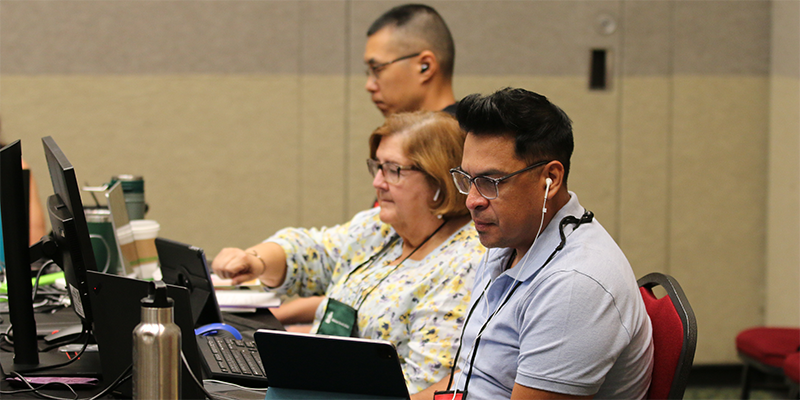
Christian Formation committee transcriptionist, Omar Chan (front), parliamentarian, Therese Howell (middle), and committee assistant, Victor Min (back) support and advise committee leadership in their first day of meetings on June 25, 2024. Photo by Randy Hobson

Christian Formation committee transcriptionist, Omar Chan (front), parliamentarian, Therese Howell (middle), and committee assistant, Victor Min (back) support and advise committee leadership in their first day of meetings on June 25, 2024. Photo by Randy Hobson.
The Christian Formation committee of the 226th General Assembly of the Presbyterian Church (U.S.A.) completed eight items of business in their first day of deliberations Tuesday. All concerned matters regarding theological education in PC(USA)-related institutions of higher education. Five new presidents of seminaries came before the committee to seek confirmation of the General Assembly of their appointments, an action required since 1986. The presidents are notable in their institutions as many of them are the first of their culture, gender or generation to serve as its president. The committee unanimously voted to recommend to the assembly that all five presidents be confirmed but not before engaging each of them individually in conversations about how their institutions will address changes in higher education and in the church.
The first president to go before the committee, the Rev. Dr. José Irizarry, to seek General Assembly confirmation (CF-06) as the 10th president of Austin Theological Seminary, lifted up the goal of “creatively envisioning ways to continue to equip leaders who can foster possibilities when facing the challenges of the day.”
The Rev. Dr. Victor Aloyo Jr. (CF-07) called himself a “child of Sunday school” when he introduced himself as the new president of Columbia Theological Seminary. He spoke about the reality that many entering seminary have had their formational experiences that led to this call outside the church in camps or other service experiences as young adults. Aloyo called these students “servant-leader-scholars” and spoke about the need for theological formation to be contextual and holistic.
“I see the church as being more expansive to include elements that have not been examined or embraced before,” said Aloyo, who advocated for an interdisciplinary approach to theological education. His hope for his new grandchild is that there will be faithful people to act as companions to their generation too and “that there will be these communities of faith that are going to welcome innovation.”
Drawing on his training in adaptive leadership, the Rev. Dr. Andrew Pomerville (CF-08), who began as president of Louisville Presbyterian Theological Seminary in July 2023, discussed the conversations the institution is having about educating leaders of the future and being in conversation with small churches about their needs in terms of leaders trained to serve their context. “Rural ministry is particularly important,” emphasized Pomerville, who noted, “we’re in the midst right now at Louisville, of doing a lot of work with rural African American churches, some founded by formerly enslaved people.”
Video tributes to theological educators, Dr. Melva Costen and Dr. Cynthia Rigby, demonstrated the commitment and creativity of educators in seminaries. As one of three items of business (along with CF-05, CF-14) not related to recommending the confirmation of seminary presidents, the committee approved these educators to be recognized for their outstanding lifetime contributions to theological education and that time be taken in the plenary to honor each awardee (CF-04). Since the establishment of the award in 1996, “there have been 20 recipients,” said Rev. Dr. Lee Hinson-Hasty, resource person for the committee. Hinson-Hasty called Costen, who died last year after a long tenure as professor at Interdenominational Theological Center, “an essential leader in creating a full and rich understanding of the African American worship experience in the PC(USA)” and lifted up how instrumental Rigby, W.C. Brown professor of theology at Austin Theological Seminary, has been in various “book series produced by Westminster John Knox and in curriculum for the PC(USA).”
The last two seminary presidents seeking confirmation from the assembly spoke about the ways theological schools can make theological education more accessible than a three-year, residential degree program for those preparing for professional ministry. Dr. Jonathan Lee Walton (CF-09) who began as the eighth president of Princeton Theological Seminary in January 2023, stressed the importance of theological education “beyond traditional clerical and clergy roles.” President Walton lifted up Princeton’s Polaris , a young adult leadership network for those considering leadership roles in the public square.
The final president to come before the Christian Formation committee was Dr. Jacqueline Lapsley of Union Presbyterian Seminary (CF-10). Lapsley echoed Walton’s discoveries about the promise of hybrid models for degree programs by highlighting the success of these programs run out of the seminary’s Charlotte campus.
Commenting on the testimony of Lapsley and the presidents that came before her that day, James Davidovich, ruling elder commissioner from Chicago Presbytery, said he felt encouraged by what he heard from the five presidents. “I’m really encouraged that you are reaching out to the community” and noted the real need to teach conflict resolution and leadership in places like corporate America and other contexts through a theological lens.
